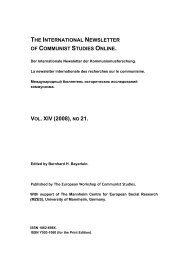11RXNdQ
11RXNdQ
11RXNdQ
Create successful ePaper yourself
Turn your PDF publications into a flip-book with our unique Google optimized e-Paper software.
Colonialism and Neocolonialism 112<br />
complex. From this abstract equality might have come forth light, he might have at last<br />
understood what was called ‘Africa’s socialist vocation’, which can be reduced more<br />
succinctly to the dilemma of neocolonialism versus collectivization. He might: I use this<br />
word not to evoke an abstract possibility, but to explain the fear which, even in chains, he<br />
inspired in his enemies. Imperialism is lucid: if it shows its cards to the excolonized, if<br />
they can perceive its intention to conceal the maintenance of an economy based on overexploitation<br />
behind a political farce, it knows perfectly well that the masses will unite<br />
against the politicians, its accomplices. Confusion in the Congo was extreme, but the<br />
Congolese would have understood quickly if someone had explained to them that they<br />
were serving the enemy: Lumumba had learned in a very short time that Belgium was<br />
going back on its promise, that the Union Minière was fomenting and supporting the<br />
secessions against the Government of the former mother country, that UN soldiers, sent<br />
to maintain order, had protected the separatist Kasavubu and left the centralist prime<br />
minister at the mercy of his enemies: even a petty bourgeois who claimed to know<br />
nothing about the economy would not need long to draw disturbing conclusions. In short,<br />
what the large companies and the évolués feared above all was the radicalization of<br />
Lumumba by the masses and the unification of the masses by Lumumba. His<br />
assassination can be said to have sealed the recent alliance of imperialism and the black<br />
petty bourgeoisie: henceforth there would be a corpse between them.<br />
But the prestige of the Congolese minister extended far beyond the borders of his<br />
country. He demonstrated the necessity of a united Africa, not in the manner of<br />
conquering states for whom unity means hegemony; but on the contrary by the weakness<br />
of the government, by that inflexible courage and that fatal but undeserved impotence<br />
which imposed on all black countries the duty to aid him. And this strict and urgent<br />
obligation was not a matter of generosity, nor of some idealistic solidarity. In fact,<br />
African nations were discovering their own destiny, the destiny of Africa in that of the<br />
Congo; neocolonial countries were deciphering the mystification which had released<br />
them from all their chains except over-exploitation. The others, those which had narrowly<br />
escaped ‘Congolization’, were discovering the mechanism, the role played by internal<br />
divisions in this collapse; they thought that nothing was saved yet, that separatism had to<br />
be fought across the whole continent, or else Africa would not escape Balkanization. In<br />
this sense, Lumumba’s failure was that of pan-Africanism. Nkrumah experienced the<br />
most bitter disappointment: in July he had sent Ghanaian troops to the Congo under the<br />
authority of the United Nations who used them against Patrice Lumumba, despite<br />
Ghana’s protests; the experience taught him that the UN was not an impartial<br />
organization giving strictly objective rulings on Third World conflicts, but a system<br />
rigorously constructed to defend imperialism everywhere in the West, even if people’s<br />
republics and Afro-Asian nations were allowed to join. But the whole of Africa,<br />
humiliated by its inability to save the man of Accra, also learnt the fate reserved for<br />
‘neutralists’. In a moment of exasperation, indignant at Hammarskjöld’s attitude,<br />
Lumumba had appealed to the USSR which had sent him some warplanes. On this<br />
occasion he had applied the strictest principles of neutrality: engage in commerce with all<br />
countries regardless of their political system, accept or request effective aid in an<br />
emergency, on condition that it is disinterested. That was all it took: the Missions were<br />
quick to baptize him a communist. Imperialism did not fail to do so either. The most




